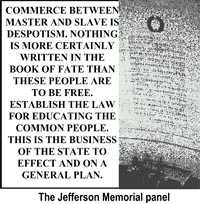
How could they really believe in racial equality, when many of the signers themselves, including the author, Thomas Jefferson, owned Black slaves that were considered chattel property? What of their slaves' unalienable rights? Were our Founding Fathers blatant hypocrites, or did the declaration simply say that our rights as British subjects in the thirteen Colonies were the same as those of our British brothers back in England?
After I read and re-read the rest of Jefferson's utterances on the Negro question, it seemed certain to me that he was not referring to racial equality when he penned the Declaration of Independence. Other than the "created equal" line in the Declaration of Independence, the most common quote by any American Founding Father used to bolster the civil-rights movement was Jefferson's classic line that reads:
Nothing is more certainly written in the book of fate, than that these people [the Negroes] are to be free.
This declamation has been used in thousands of books, articles, plays, documentaries and movies - more than any other famous enunciation on the race issue. On the beautiful Jefferson Memorial in Washington, it is found chiseled as sacred writ on the huge interior panels of granite. The next sentence on the wall begins with the word education. In media articles the quotation ends with the words "are to be free." Neither the articles nor the memorial's architect give the public the honesty of an ellipsis, for the quotation is clearly an intentional deception that completely alters his original meaning.
The quotation itself is only a fragment of one of Jefferson's sentences written in his autobiography:
Nothing is more certainly written in the book of fate than that these people [Negroes] are to be free. Nor is it less certain that the two races, equally free, cannot live in the same government. Nature, habit, opinion has drawn indelible lines of distinction between them. It is still in our power to direct the process of emancipation and deportation peaceably and in such slow degree that the evil will wear off insensibly, and their place be . . .pari passau filled up by free White laborers. If on the contrary it is left to force itself on, human Nature must shudder at the prospect held up.1
When I first read the complete text of the Jefferson statement, It stunned me. Not only did Jefferson not believe in racial equality, he stated clearly that Nature had made the Black and White races indelibly different that they couldn't live in the same government, and that unless the Black race was returned to Africa, he "shuddered" for America's future. The egalitarian sources that wrote loftily of his belief in equality had brazenly deceived me.
- Jefferson, Thomas. (1829). Autobiography, First published in 1829 and later by an Act of Congress in 1853. p.1.